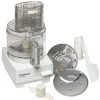Cuisinart DLC-10C DLC-10S Manual - Page 20
directly, boltoni, Excessively, sticky, dough, bowl., seconds, ounces, 403fl., recipe
 |
UPC - 086279100207
View all Cuisinart DLC-10C manuals
Add to My Manuals
Save this manual to your list of manuals |
Page 20 highlights
TECHNIQUES FOR KNEADING YEAST DOUGH WITH THE DOUGH BLADE 14 Problems and Solutions with Typical Bread Dough Blade doesn't incorporate ingredients Always slart processor before adding liquid Add liquid in slaw, stead/ stream, only as lasl as dry ingredients absorb it. If you hear liquid sloshing, stop adding It but do not turn oil machine. Instead, wait until ingredients in work bowl Have mixed, then add remaining liquid slowly. Pour liq uid onto dough as u passes under Iced tube; do not pour liq uid directly onlo boltoni of work bowl. Blade rises in work bowl Blade may not have been pushed down as far as it will go before processing started. Excessively sticky dough can cause blade lo rise even (hough it cleans inside ol work bowl. If dough leels very sticky, reinsert blade and immediately add 2 tablespoons flour through feed tube while machine is running. Dough doesn't clean inside of work howl. ■ Amount of dough may exceed maximum capacity of your iood processor. Remove half and process in 2 batches. ■ Dough may be too dry. If it feels crumbly, add water-1 tablespoon at a time - while machine is running, until dough oecomes moist and cleans inside Of work bowl. Wait 10 seconds between additions of water • Dough may be too wet While machine is running, add 1 tablespoon of (lour. If necessary, add more ■ 1 tablespoon at a time ■ until dough cleans inside of work bowl and forms a ball. ■ Plastic dough blade is intended only for recipes calling for at least 3-1/2 cups of flour(17-1/2 ounces, 403fl). If your recipe calls for less flour, remove piaslic dough blade and insert metal blade. Always use metal blade for recipes calling tor less than 3-1/2 cups of flour, such as dough. Null of dough (onus on top of blade and does not become uni formly kneadedStop machine, carefully remove dough, divide it into 3 pieces and redistribute them evenly in work bowl. Conlinue processing until dough is uniformly soft and pli able. Dough feels tough after kneading Divide dough into 2 or 3 pieces and redistribute evenly in bowl. Process 10 seconds or until uni formly soft and pliable. Soft (loiio.li or liquid leaks onto hase ol load processor Always start processor before adding liquid and add liquid only as fasl as dry ingredients absorb it. Nub o! dough loans. Dough is too dry Dough is too wet and sticky.















